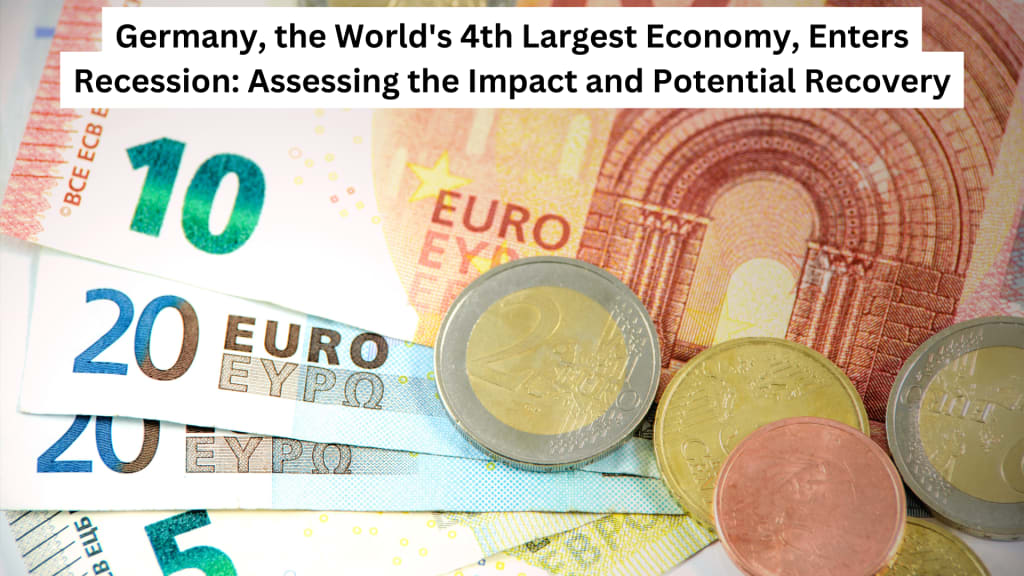Germany, the World's 4th Largest Economy, Enters Recession: Assessing the Impact and Potential Recovery
Germany's Recession: Assessing the Implications and Strategies for Recovery in the Global Economy

Introduction:
Germany, often referred to as the economic powerhouse of Europe, has recently entered a state of recession. As the fourth-largest economy globally, Germany's economic performance significantly influences the European Union and global markets. This article will explore the reasons behind Germany's recession, analyze its implications on the national and international levels, and discuss potential strategies for recovery.
The Causes:
Several factors have contributed to Germany's entry into recession. Firstly, the global economic slowdown and trade tensions, particularly between the United States and China, have adversely affected Germany's export-oriented economy. Germany heavily relies on exports, especially in the automotive and manufacturing sectors, which have experienced a decline in demand and disruptions to supply chains.
Furthermore, the COVID-19 pandemic has played a significant role in pushing Germany into recession. The pandemic-induced lockdowns, travel restrictions, and reduced consumer spending have taken a toll on various sectors, including retail, hospitality, and tourism. The country's successful containment efforts initially mitigated the impact, but subsequent waves and prolonged restrictions have led to a more severe economic downturn.
Implications for Germany:
Germany's recession has several implications for its domestic economy. Firstly, it has led to a decline in business investment and consumer spending, which has a cascading effect on the overall economic activity. This slowdown in demand has resulted in reduced production levels and job losses across multiple sectors, leading to a rise in unemployment rates.
Additionally, the recession poses challenges to the German government's fiscal policy. With decreased tax revenues and increased government spending on stimulus packages and social support, there is a strain on public finances. This necessitates careful fiscal management to balance economic recovery efforts with long-term sustainability.
Germany's recession also raises concerns about its ability to maintain its role as an economic engine within the European Union. As the largest economy in the Eurozone, Germany's downturn could have a significant impact on the economic stability of neighboring countries. This highlights the interconnectedness of European economies and the need for coordinated efforts to ensure recovery and resilience.
Implications for the European Union and Global Economy:
Germany's recession reverberates beyond its borders, affecting the European Union and the global economy. The European Union heavily depends on Germany's economic strength, and a prolonged recession could hinder the bloc's overall recovery from the pandemic. It may also exacerbate economic disparities among EU member states and increase the challenges of maintaining fiscal and monetary union.
On a global scale, Germany's recession has implications for international trade and investment. The decline in German exports affects trading partners worldwide, particularly those within the European Union and beyond. This interconnectedness underscores the need for global cooperation and policy coordination to address the broader economic challenges arising from Germany's recession.
Strategies for Recovery:
To navigate the path to recovery, Germany must implement effective strategies. Firstly, targeted fiscal stimulus measures can stimulate demand and support affected sectors. Investment in infrastructure projects, renewable energy, and digitalization can not only create jobs but also contribute to long-term growth and sustainability.
Supporting small and medium-sized enterprises (SMEs) is crucial as they form the backbone of Germany's economy. Measures such as access to affordable credit, streamlined bureaucracy, and incentivizing innovation can bolster SMEs' resilience and promote entrepreneurship.
Germany can also benefit from diversifying its export markets. Reducing reliance on a few key markets by exploring new trade agreements and expanding into emerging economies can mitigate the impact of future economic disruptions. Moreover, promoting domestic consumption through targeted incentives and reforms can create a more balanced economy less dependent on external demand.
Investing in research and development (R&D) and fostering innovation will be crucial for Germany's long-term economic competitiveness. Embracing technological advancements, such as artificial intelligence, automation, and clean technologies, can spur growth, enhance productivity, and create new industries and job opportunities.
Furthermore, Germany can leverage its skilled workforce by focusing on upskilling and reskilling programs. Providing training opportunities to workers affected by the recession can facilitate their transition into sectors with future growth potential and contribute to reducing unemployment rates.
Collaboration within the European Union is vital to overcome the challenges posed by Germany's recession. Coordinated fiscal and monetary policies, along with the efficient utilization of EU recovery funds, can support economic recovery across member states. Strengthening the EU's internal market and promoting sustainable development and innovation can enhance Europe's overall resilience.
Conclusion:
Germany's entry into recession serves as a stark reminder of the vulnerability of even the strongest economies in the face of global challenges. The causes, implications, and potential recovery strategies discussed in this article highlight the need for proactive measures at both the national and international levels. By implementing a comprehensive recovery plan that focuses on diversification, innovation, and supporting affected sectors, Germany can navigate its way out of the recession and contribute to the broader economic stability and growth of the European Union and the global economy.
About the Creator
Plantera Digital Media
welcome to my page here i share
- Stories
- Interesting facts about the world around us
- Thought-provoking theories about the nature of reality
- Useful information that can help people in their lives






Comments
There are no comments for this story
Be the first to respond and start the conversation.